
“Mel Brooks will do anything for a laugh,” Roger Ebert once wrote. “Anything. He has no shame.” This was not an attack. It was praise. Ebert described seeing his directorial debut, The Producers, in 1968 as “a bomb going off inside the audience’s sense of propriety.” He saw in the comic-turned-filmmaker someone in the tradition of the Marx Brothers: fellow anarchists who attack everyone and everything, who stand against good taste and pretention but also against prejudice and power. (His comedies are filled with digs at the greedy rich, none more topical than this.) As a movie director, Brooks isn’t often thought of as a major stylist, but his movies are nothing if not stylized. They’re joke machines, and any inch not being used for a gag — or a delightful musical number — is, to him, wasted space.
Though he began his career as a Borscht Belt comic, Brooks was a reluctant performer. He preferred to stay behind-the-scenes or share the stage with his friend Carl Reiner, as in their seminal “2000 Year-Old-Man” act. When Brooks started directing, he stuck to bit parts and supporting turns. He only started taking center stage with Silent Movie, though even there he gladly surrendered the spotlight to other performers. But the main star of a Mel Brooks movie is always Mel Brooks, whose hyperactive, happy-to-shock voice is always loud and clear, even when he’s nowhere to be seen.
Brooks has only directed 11 movies, and though some aren’t all that, the majority remain stone-cold classics. They can be “problematic,” too, especially now — Brooks, like many at the time, rarely passed up a chance to mock mincing gay men — but as gleefully as they are to offend, they are, in their heart of hearts, on the side of the angels. Let’s look at each one and see how they hold up.
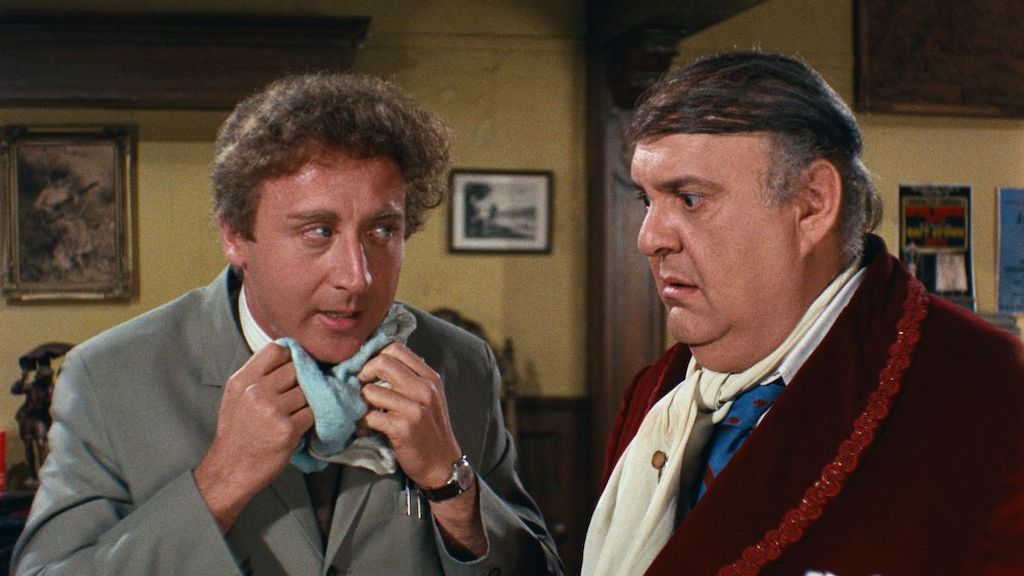
The Producers (1967)
The story: A washed-up theater producer (Zero Mostel) and an impossibly anxious accountant (Gene Wilder) team up to scam their way to a fortune by mounting Broadway’s worst-ever show: a pro-Nazi musical extravaganza entitled Springtime for Hitler.
What works: It eventually became Brooks’ single biggest cash cow, spun off into a Broadway musical, a movie version of that musical, and wound up on an entire season of Curb Your Enthusiasm. But try to remember what it was when first released: a movie so dirty no major studio would distribute it, so offensive it had to play on the underground circuit, earning its money — and its two Oscar nominations — gradually. Rough and ramshackle, it shares a lot of its DNA with the era’s campy exploitation movies, from Herschell Gordon Lewis to Russ Meyer to (later) John Waters. But instead of sex and violence, The Producers’ vice is jokes about randy old women, hippie weirdos with finger cymbals, and bird-loving Nazi playwrights.
The Producers is available to rent on Amazon Prime.
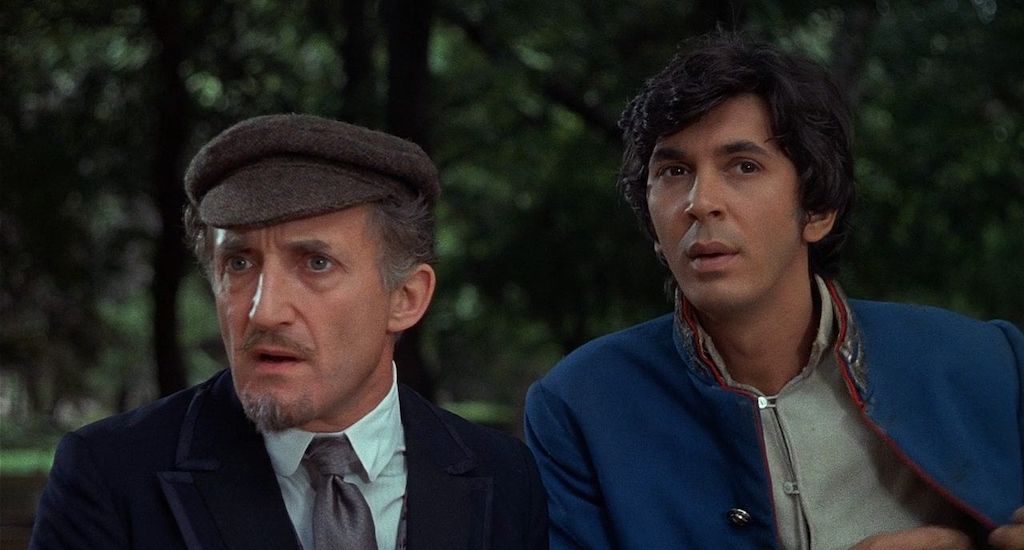
The Twelve Chairs (1970)
The story: For his Producers chaser, Brooks turned to an oft-adapted satirical Russian novel set after the Revolution, following a destitute former aristocrat (Ron Moody) and a conman (Frank Langella) who team up to locate a fortune in jewels that had been sewn into one of twelve MIA dining room chairs, located somewhere in the vast, newly communist state.
What works: It’s the least seen or discussed of the Brooks canon, and for good reason: It tells a straightforward story whose humor is mostly character-based. It taught him a valuable lesson: Don’t make movies like this. And yet it’s still pretty good, even if Brooks never makes the story his own. He tries, though. Years before Silent Movie, Brooks was doing (mostly) silent slapstick set pieces. And it’s a fascinating look at the early days of the Soviet Union, proving that sometimes it’s comedies — like the Roman-set A Funny Thing Happened on the Way to the Forum and the Medieval Monty Python and the Holy Grail — that wind up being more accurate depictions of history than serious epics. Brooks could have had a long and healthy career making light, largely anonymous comedies like this. Instead, he thought big.
The Twelve Chairs is not available to rent but it is part of the Mel Brooks Collection on Blu-ray.

Blazing Saddles (1974)
The story: A crooked politician (Harvey Korman) wants to run a train line through a frontier town, so he devises a scheme: Drive its inhabitants to leave by appointing a black man (Cleavon Little) as their new sheriff, assuming that racism will trump self-preservation and common sense. His plan almost works.
What works: When Brooks and team (including co-writer Richard Pryor) lampooned the Western, the once-mighty genre was all but dead. You could even lump Blazing Saddles in with the era’s “revisionist Westerns,” like McCabe & Mrs. Miller and The Wild Bunch, which dismantled the myths about America’s past that had graced screens for decades. In some ways it’s the most revisionist Westerns, with no respect for people of the land — or, as Gene Wilder’s Waco Kid put it, “morons.” Anti-PC types love to rally around it as a movie that insults everyone, that could never be made today in our woke times. But there’s one group that proves its biggest target: stupid white people. Its anger, though, is buried deep under endless, silly jokes about farts, about punching horses, about Marlene Dietrich, about authentic frontier gibberish, about a Baskin-Robbins with one flavor. Too bad its best gag never came to be: Brooks offered the role of the Waco Kid to the genre’s mightiest star, 66-year-old John Wayne, who decided he couldn’t appear in a script so dirty. But, he told him, “I’ll be the first one in line to see it.”
Blazing Saddles is available to stream on Hulu.

Young Frankenstein (1974)
The story: Brooks takes on the Universal monster movies of the 1930s, with a never-more-wigged-out Gene Wilder as the son of a mad scientist who steps into his father’s shoes and creates an even more disastrous Prometheus (Peter Boyle).
What works: Brooks’ directorial debut is barely a movie, but his fourth is a technical marvel. His follow-up to Blazing Saddles — released the same year, insanely — goes one step further in parodying a genre: It meticulously, painstakingly recreates the look and feel of then-40-year-old James Whale pictures. There are fine yuks about whinnying horses and “knockers” and Marty Feldman’s weird eyes. But perhaps the best laugh is that it looks exactly like The Bride of Frankenstein, from the shadowy black-and-white to the gargantuan Gothic sets to the scratchy score. Young Frankenstein has probably done more over the half-century to turn young viewers into lovers of old, black-and-white movies than any crusty professor, while Brooks was an early adopter of the idea that Gene Hackman — serious, Oscar-winning thespian, cast as the lonely, clumsy, espresso-loving blind man — was a comedy gold mine.
Young Frankenstein is available to stream on Starz on Amazon or Roku.
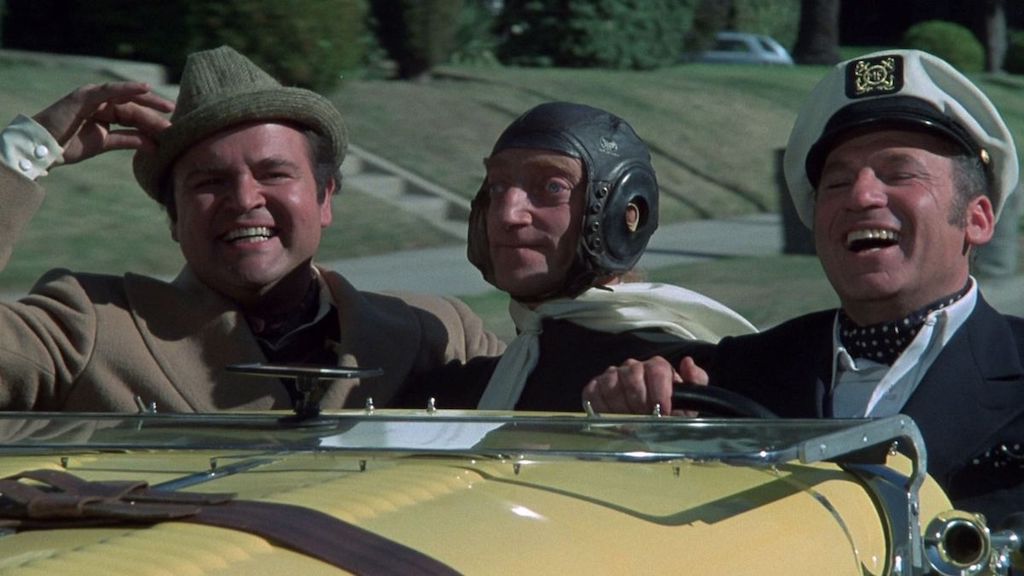
Silent Movie (1976)
The story: Brooks plays a disgraced director named Mel Funn who, along with his associates (Dom DeLuise and Marty Feldman), comes up with a brilliant idea for a comeback: make Hollywood’s first silent movie in 40 years — which is what Silent Movie (with one tiny exception) turned out to be.
What works: It’s a stunt, but is it more? Not exactly — Brooks’ comedy has always been more verbal than visual, and the slapstick and sight gags here pale in comparison to the early, funny Woody Allen movies, especially Sleeper. What it is is incredibly lovable. The joy Brooks and team had in making it beams off the screen, and if you’re not laughing, you’re at least smiling. While only a few jokes are all-timers — the famous Marcel Marceau cameo and a first-rate d*ck joke among them— the movie does get funnier as it goes on, with a final stretch that really, finally cooks. It didn’t inspire a rash of imitation silent film comedies, but anytime a movie or show takes the challenge of going wordless — like the Buffy the Vampire Slayer episode “Hush” — it’s almost certainly thanks to Mel Brooks.
Silent Movie is not available to rent but it is part of the Mel Brooks Collection on Blu-ray.

High Anxiety (1977)
The story: A new doctor at the Psycho-Neurotic Institute for the Very, Very Nervous (played by Brooks) is wrongfully accused of a crime he didn’t commit, attacked while taking a shower, and mysteriously besieged upon by angry birds. He also has vertigo.
What works: The key to Brooks’ best spoofs is that they come from love, not derision. He had beef with Westerns in Blazing Saddles, but he also knew the genre inside out from decades of filmgoing. There’s nothing but affection for the subject of High Anxiety, which is the films of Alfred Hitchcock, and while that results, as it did in Silent Movie, in a comedy without much bite, it’s still a mad, gleeful weirdo of a film, with some of its best jokes being about film grammar and clichés. (Any professor who needs to teach the difference between diegetic and non-diegetic sound can always pull up this gag, which was later stolen by The Simpsons.) Hitchcock, who had made his last film only one year prior, adored it. Brooks, meanwhile, wound up attending his funeral three years later.
High Anxiety is available to rent on Amazon Prime or to stream on Starz on Amazon or on Roku.
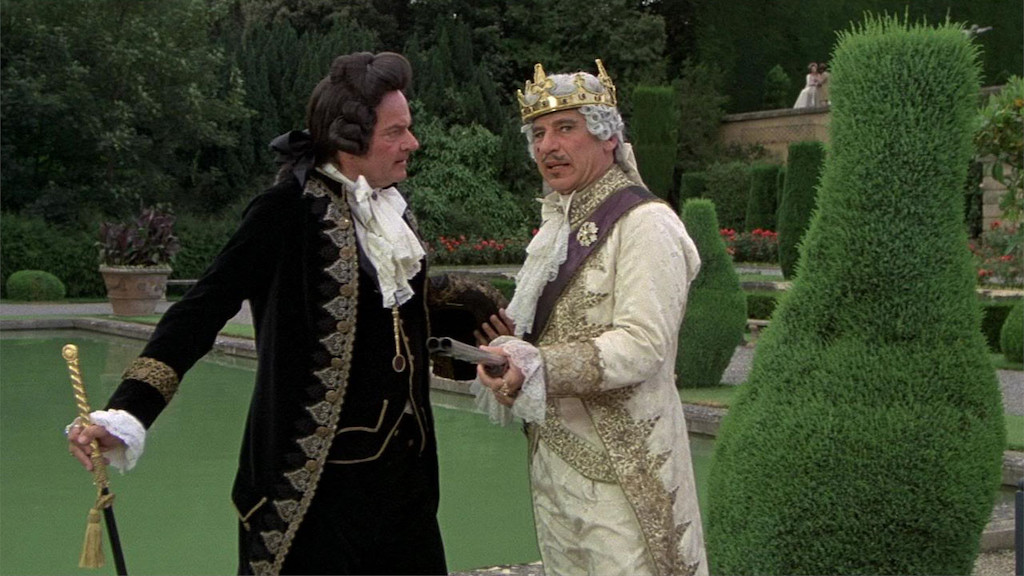
History of the World, Part 1 (1980)
The story: It’s five stories, actually, each sending up a different historical time (and historical movie genre). There’s a long parody of Roman epics, a medium-sized one about the French Revolution, plus shorter ones about cavemen, Moses, and the Spanish Inquisition. It ends with a segment called “Jews in Space.”
What works: At what point did Mel Brooks tell Orson Welles that he’d start the movie narrating over masturbating cavemen? The Brooks film with the least focus is also maybe his funniest, possibly because it’s also his bluest. He only went R twice, on Blazing Saddles and even moreso here, which features untold penis jokes, boob jokes, piss jokes, Oedipus jokes, and one of his sauciest sight gags: a sign for a Roman buffet and orgy with the tagline, “First served, first come.” Like Trey Parker, Matt Stone, and John Mulaney after him, Brooks was always a barely closeted song-and-dance man, his movies always stopping dead at least once for some elaborate number. History gives us an 11-minute whopper about the Spanish Inquisition that ends in a leftfield Busby Berkeley-Esther Williams homage featuring horny rabbis. It’s good to be Mel Brooks.
History of the World, Part 1 is not available to rent but it is part of the Mel Brooks Collection on Blu-ray or to purchase on Fandango Now.

Spaceballs (1987)
The story: A shaggy-haired rogue named Lone Star (Bill Pullman) and his half-dog partner named Barf (John Candy) try to save a feisty princess (Daphne Zuniga) from a tyrannical bad guy with a giant dark helmet, named Dark Helmet (Rick Moranis).
What works: Some critics wondered why Mel Brooks was parodying Star Wars four years after what was then assumed to be the final Star Wars movie. If anything, Brooks was early, not late. Little did everyone know that Star Wars would never disappear. It would live forever. And so has Spaceballs. Brooks clearly doesn’t care about Star Wars the way he adores Westerns or ’30s horror movies or Hitchcock thrillers, making Spaceballs closer to a MAD Magazine lampoon, riffing on a specific movie, not a whole genre. But that also gives him a freedom to go full loopy. There are specific Star Wars gags: the opening crawl, a lightsaber-as-penis yuk, Yoda, plus some airlifted-in digs at Star Trek and Alien. But the best jokes are simply Brooks being dumb (e.g., Lone Star saying he was born in the “Ford Galaxy”). And as in High Anxiety, there are great jokes about film form, from the one about stunt doubles to that mind-melting bit where they bust out the VHS tape of the movie in progress.
High Anxiety is available to rent on Amazon Prime or to stream on Starz on Amazon or on Roku.
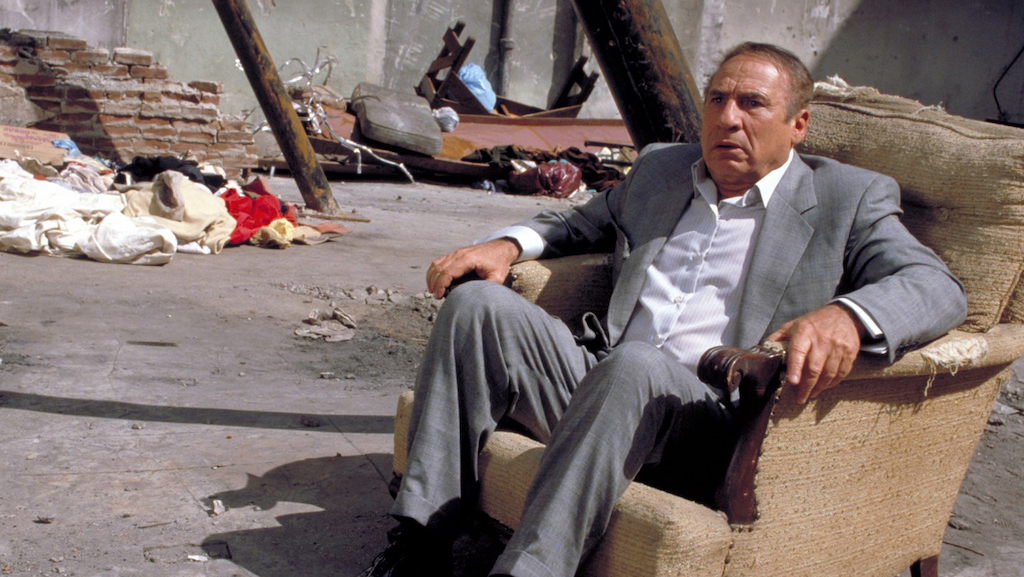
Life Stinks (1991)
The Story: Brooks plays a greedy, environment-hating CEO who makes a bet with a rival: He has to be homeless for 30 days, or else he loses out on a project to raze the Los Angeles slums.
What works: There are two gambles Brooks made here: Could he successfully make his first non-parody movie since The Twelve Chairs, and could he give it a kick-me title without any critics actually kicking. He failed on both counts. He also bet that he could make a movie in which a billionaire would have a change of heart after living amongst the poor, which is maybe the only thing funny in the film. The Producers aside, straight narrative and Brooks don’t mix, and despite the good intentions he struggles to say anything meaningful, or at the least offer some solid gags. The only highlight is a charming musical number, and maybe a musical is what Life Stinks should have been. Indeed, as recently as last year Brooks was suggesting it should be the next one of his films to invade Broadway. Why not! Surely now’s the time for a big-budget show about class warfare.
Life Stinks is available to rent on Amazon Prime.
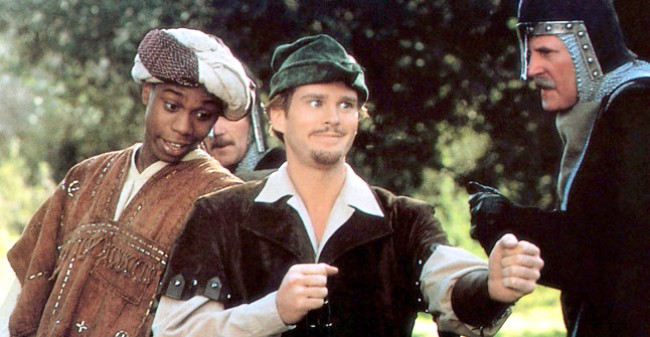
Robin Hood: Men in Tights (1993)
The story: Brooks takes on the Kevin Costner-starring Robin Hood: Prince of Thieves, this time with a real Brit, Carey Elwes, at the helm.
What works: Credit where it’s due on one of the low points on Brooks’ resume: He was ahead of the curve on Dave Chappelle. When he appeared in Men in Tights, the future comedy god was only 19. He’d never done a movie, and he was still cutting his teeth on the late-night TV circuit. But Brooks knew. He cast him as the rough equivalent of Morgan Freeman’s Thieves character, even giving him a Blazing Saddles joke to close out the film. It’s one of the only inspiring choices Brooks made on this, a not terribly inventive parody that doesn’t find much to lampoon in a film that hasn’t stood the test of time either. But no Mel Brooks film is worthless, and at the very least you have to respect that, in 1995, he gave the plum role of Prince John to no less than Richard Lewis.
Robin Hood: Men in Tights is available to rent on Amazon Prime.
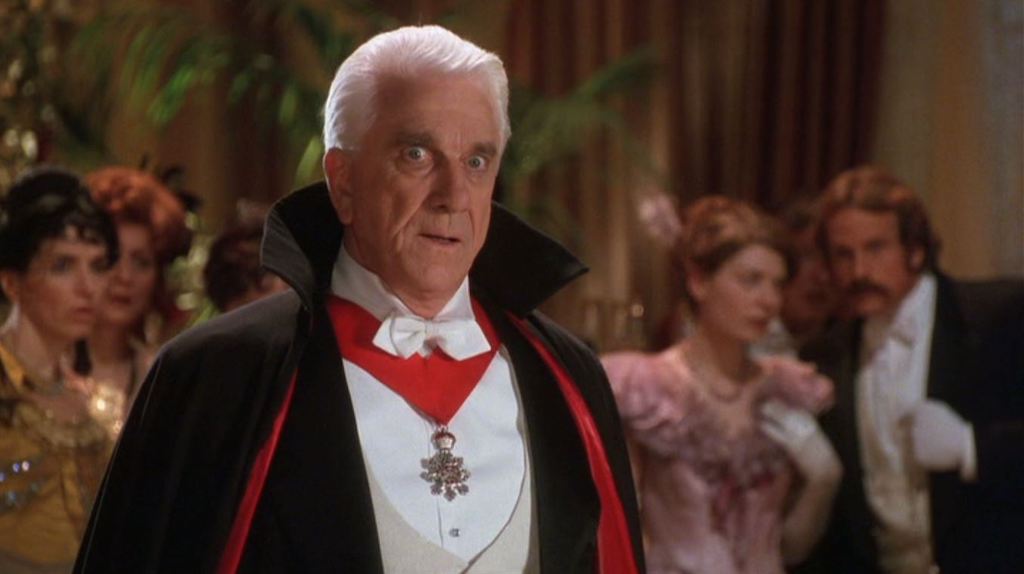
Dracula: Dead and Loving It (1995)
The story: Three years after Francis Ford Coppola’s Bram Stoker’s Dracula, Brooks paired with another parody royalty, Leslie Nielsen, to take on the vampire genre.
What works: When released, the film that will almost certainly turn out to be Brooks’ swan song seemed like a feeble last gasp by a once-great talent. Now it plays more like a major auteur’s eccentric final work — a man out of step with the day’s trends stubbornly doing his thing by hook or crook. Like Robin Hood: Men in Tights, it stays too close to the source to be truly inventive, and Nielsen’s straight-faced shtick had by then long gone out of whack. But approach it with low expectations and there are enough small, incredibly dumb yuks here — “He’s a doctor of rare diseases as well as theology and philosophy.” “And gynecology.” “Oh, I didn’t know you had your hand in that, too” — that it qualifies as underrated. Think of it as spending time with an old Borscht Belt cut-up still flinging out corny jokes. In other words, it’s like spending time with Mel Brooks.
Dracula: Dead and Loving It is available to stream on Vudu or rent on AppleTV, Redbox, Google Play, and Fandango Now.
